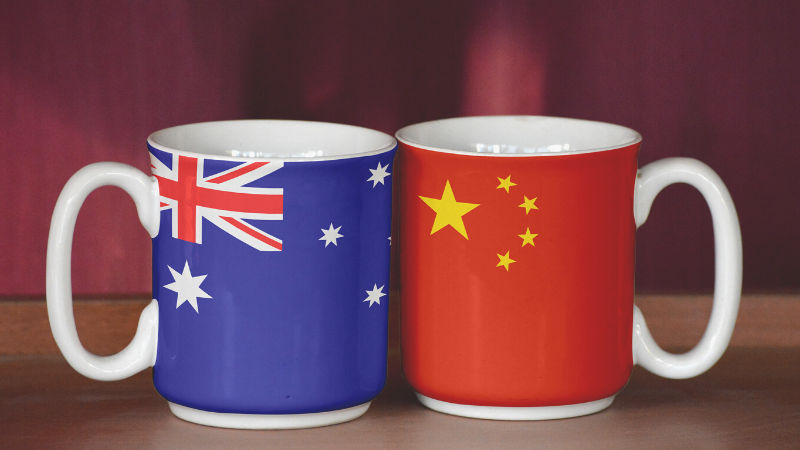Perspectives | National sovereignty, Australia and the PRC: More similarities than differences
October 07 2021

Perspectives is UTS:ACRI's commentary series, featuring a piece on a topical subject in the Australia-China relationship from an invited expert contributor.
Both President Xi Jinping and Prime Minister Scott Morrison have heightened their national sovereignty rhetoric for geopolitical purposes and to deal with internal divisions.
President Xi in a much-quoted speech at the 100th anniversary of the Communist Party of China (CPC) in July this year warned that foreign forces were attempting to bully the People’s Republic of China (PRC) and are ‘on a collision course with a great wall of steel’. He said the PRC’s sovereignty is challenged like never before and it would defend its sovereignty with blood. Similarly, Prime Minister Morrison speaking to the Foreign Relations Bill in August 2020, emphasised that Australia ‘needs to protect itself’ from foreign governments ‘seek[ing] to undermine the sovereignty of Australia’s foreign policy’. And in a statement on COVID-19 in April 2020, the Prime Minister said that ‘[o]ur sovereignty is measured in our capacity and freedom to live our lives as we choose in a free, open and democratic society’. Within the context of the virus he has also repeatedly used wartime rhetoric of ‘never surrender[ing]’.
In both the PRC and Australia, the elevation of national sovereignty involves, firstly, how they are administered at a micro level and, secondly, how they seek to forge macro policy unity.
In thinking of the micro level, universities are a good starting point as in both the PRC and Australia they are crisscrossed by multiple government regulations, which require administrative decisions on national interest. For example, at play in elite universities in the PRC is the combination of Confucian values of serving the nation integrated with the US academic model and Ivy League networks. So, for instance, to hold an international conference a university department requires a state official to assess whether it is in the national interest. The outcome is usually positive, but the official’s national interest test induces caution and risk aversion. Since the 1979 ‘opening up’ of the PRC to the world the degree of risk aversion has oscillated depending on how the official assesses the risk by reading the political tea leaves of the day.
The same risk aversion phenomenon is now occurring in Australian universities, especially with respect to relationships with the PRC. Since the introduction of new laws regulating and intervening in universities, notably, the Defence Amendment (Call Out of the Australian Defence Force) Act 2018, to allow defence force personnel to defend Australia, including on university campuses and the all-powerful Foreign Relations (State and Territory Arrangements) Act (2020) (the Foreign Relations Act), as well as the creation of the University Foreign Interference Taskforce, the national interest is being assessed by university management so as not to send a red flag to Canberra and thereby arouse ministerial sanctions. The other problem facing Australian universities is that the Foreign Relations Act is built on the false assumption that universities in the PRC are overtly governed by the CPC. For example, one condition of the Foreign Relations Act is the autonomy of the foreign university’s governing body, where if ‘a majority of the members of the university’s governing body are required…to be members or part of (however described) the political party that forms the foreign government’ (read: the CPC), then it fails that test. But in the PRC, university governing bodies are basically titular and symbolic – universities answer to their president and party secretary, not their board.
At a macro level, the national sovereignty evocation is a clarion call for a unified China in challenging geopolitical and domestic times. For example, President Xi’s demand for national sovereignty is not merely about borders but it also about addressing divisive political-economic issues within the PRC. As University of Adelaide Professor Mobo Gao notes, the list of divisive issues is long and includes: how to alleviate absolute poverty in countryside; how to prevent the PRC copying the US financial model, where hedge-funds create paper wealth and spur house price speculation; how to deal with tech company oligopolies and their super profits; how to increase tax revenue to pay for pensions; how to regulate the growing commercialisation of education via private tutors; how to control health costs; and how to devalue the entertainment industry, where celebrities become role models for excessive wealthy lifestyles. Given the magnitude of the changes and the mass of people affected by these policies, some who are very powerful and wealthy, others not so, President Xi’s use of national sovereignty to bolster the current leadership support is understandable. However, what accompanies this national interest rhetoric is something that jars inside and outside the PRC, that is, the attempt to create this new modernity around ‘Xi Jinping thought’ and the recreation of revolutionary language, which is (mis)interpreted as returning to the Cultural Revolution and Mao’s thought control.
In Australia, at the macro political-economy level, Prime Minister Morrison’s use of national sovereignty has become a tool to reregulate higher education to serve a domestic job market and to police Australian Research Council (ARC) grants. Equally, the national interest rhetoric serves to blame the PRC for the COVID-19 virus and its global spread. Plus, the national interest test is used by Australia’s Foreign Investment Review Board and the Treasurer to block investments from PRC companies. It has also been used to raid the home of a journalist, the offices of the ABC, then to accuse two Labor Party MPs of treachery, and led to the visa cancellation of two mainland Chinese academics specialising in Australian studies, all without any semblance of transparency. The national interest discourse is also utilised to push back against addressing global climate change. Most recently, national sovereignty came to the fore in Australia’s decision, under the auspices of the AUKUS trilateral partnership, to cancel its $90 billion submarine contract with France in preference for a yet to be determined US/UK underwater vessel to contest the rise of the PRC.
In sum, a national sovereignty ideology is a handy governmental tool in both the PRC and Australia to gain broad support when dealing with both foreign policy and internal divisions. Whilst Australia argues its national interest position is forged by pluralist democratic values compared to the PRC’s one-party rule, there are many similarities between how national sovereignty serves both systems to reinforce power relations in difficult times.
Greg McCarthy is an Adjunct Professor at the Australia-China Relations Institute, University of Technology Sydney.

